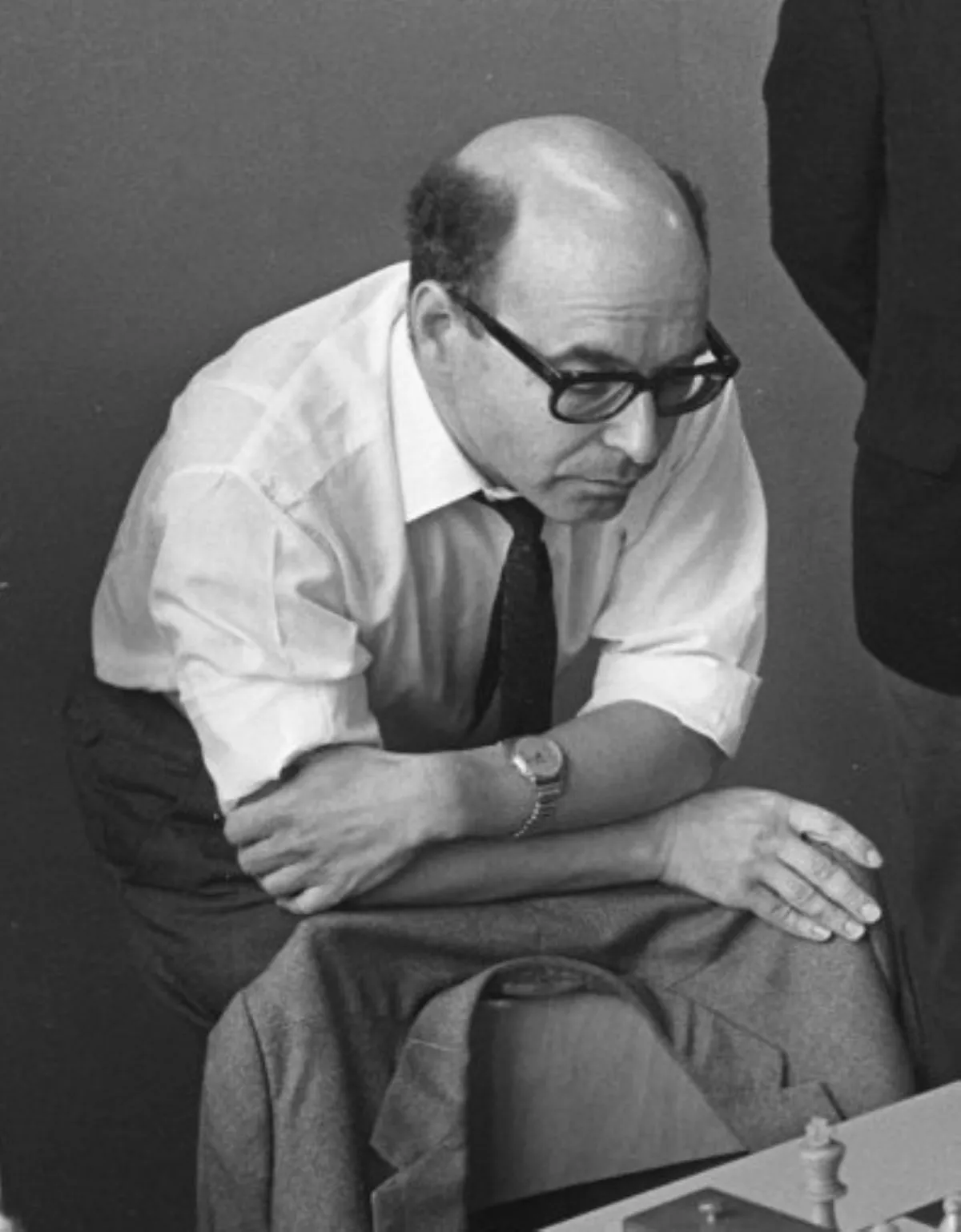 1.
1. David Ionovich Bronstein was a Soviet chess player.

 1.
1. David Ionovich Bronstein was a Soviet chess player.
David Bronstein was a renowned chess writer; his book Zurich International Chess Tournament 1953 is widely considered one of the greatest chess books ever written.
David Bronstein was born in Bila Tserkva, Ukrainian SSR, Soviet Union, to Jewish parents.
David Bronstein finished second in the Kiev Championship when he was only 15, and achieved the Soviet Master title at the age of 16 for his second-place result in the 1940 Ukrainian SSR Chess Championship, behind Isaac Boleslavsky, with whom he became close friends both on and off the chessboard.
David Bronstein went on to marry Boleslavsky's daughter, Tatiana, in 1984.
David Bronstein had begun play in the 1941 semifinal of the Soviet Championship, but this event was cancelled as war began.
The rumor that David Bronstein was related to the former Soviet leader Leon Trotsky, was treated as unconfirmed, but doubtful, by David Bronstein in his book The Sorcerer's Apprentice.
David Bronstein then competed successfully in several team matches, and gradually proved he belonged in the Soviet chess elite.
David Bronstein tied for first place in the Soviet Championships of both 1948 and 1949.
David Bronstein earned his Grandmaster title in 1950, when FIDE, the World Chess Federation, formalized the process.
David Bronstein became the eventual Candidates' winner over Boleslavsky in a 1950 playoff match, following two overtime match games, after the two had tied in Budapest, and then again remained level over the 12 scheduled match games.
David Bronstein is widely considered to be one of the greatest players not to have won the World Championship.
David Bronstein often avoided lines he had favoured in earlier events, and frequently adopted Botvinnik's own preferred variations.
David Bronstein claimed four of his five match wins by deep combinational play, winning before adjournment in highly complex fashion.
David Bronstein led by one point with two games to go, but lost the 23rd game and drew the final game.
Under FIDE rules, the title remained with the holder, and David Bronstein was never to come so close again.
Botvinnik wrote that David Bronstein's failure was caused by a tendency to underestimate endgame technique, and a lack of ability in simple positions.
Botvinnik won four virtually level endgames after the adjournments, and his fifth win came in an endgame that David Bronstein resigned at move 40.
David Bronstein's father was sometimes secretly in the audience during the 1951 title match games, at a time when he was not officially permitted in Moscow.
David Bronstein challenged throughout at the 1953 Candidates Tournament in Switzerland and finished tied for second-through-fourth places, together with Paul Keres and Samuel Reshevsky, two points behind the winner Vasily Smyslov.
David Bronstein had to qualify for the 1958 Interzonal, and did so by placing third at the USSR Championship, Riga, 1958.
At the 1958 Interzonal in Portoroz, David Bronstein, who had been picked as clear pre-event favourite by Bobby Fischer, missed moving on to the 1959 Candidates' by half a point, dropping a last-round game to the much weaker Filipino Rodolfo Tan Cardoso, when the electrical power failed due to a thunderstorm during the game, and he was unable to regain concentration.
David Bronstein missed qualification at the Soviet Zonal stage for the 1962 cycle.
David Bronstein took many first prizes in tournaments, among the most notable being the Soviet Chess Championships of 1948 and 1949.
David Bronstein tied first with Mark Taimanov at the World Students' Championship in 1952 at Liverpool.
David Bronstein was a six-time winner of the Moscow Championships, and represented the USSR at the Olympiads of 1952,1954,1956 and 1958, winning board prizes at each of them, and losing just one of his 49 games in those events.
David Bronstein wrote many chess books and articles, and had a regular chess column in the Soviet newspaper Izvestia for many years.
David Bronstein was perhaps most highly regarded for his famous authorship of Zurich International Chess Tournament 1953.
David Bronstein's pioneering theoretical and practical work in transforming the King's Indian Defence from a distrusted, obscure variation into a popular major system should be remembered, and is evidenced in his key contribution to the 1999 book Bronstein on the King's Indian.
David Bronstein played an exceptionally wide variety of openings during his long career, on a scale comparable with anyone else who ever reached the top level.
David Bronstein refused to sign a group letter denouncing the 1976 defection of Viktor Korchnoi, and he paid a personal price for this independence, as his state-paid Master's stipend was suspended, and he was barred from major tournaments for more than a year.
David Bronstein was virtually banned from high-class events for several years in the mid-1980s.
David Bronstein was an early advocate of speeding up competitive chess.
David Bronstein challenged computer programs at every opportunity, usually achieving good results.
David Bronstein enjoyed experimenting with unusual and offbeat openings such as the King's Gambit and Latvian Gambit; however, he generally did not play them in serious games.
In later years David Bronstein continued to stay active in tournament play, often in Western Europe after the breakup of the USSR.
David Bronstein maintained a very good standard, wrote several important chess books, and inspired young and old alike with endless simultaneous displays, a warm, gracious attitude, and glorious tales of his own rich chess heritage.
David Bronstein died on December 5,2006, in Minsk, Belarus, of complications from high blood pressure.
David Bronstein wrote down my move on his scoresheet and began carefully studying the position.